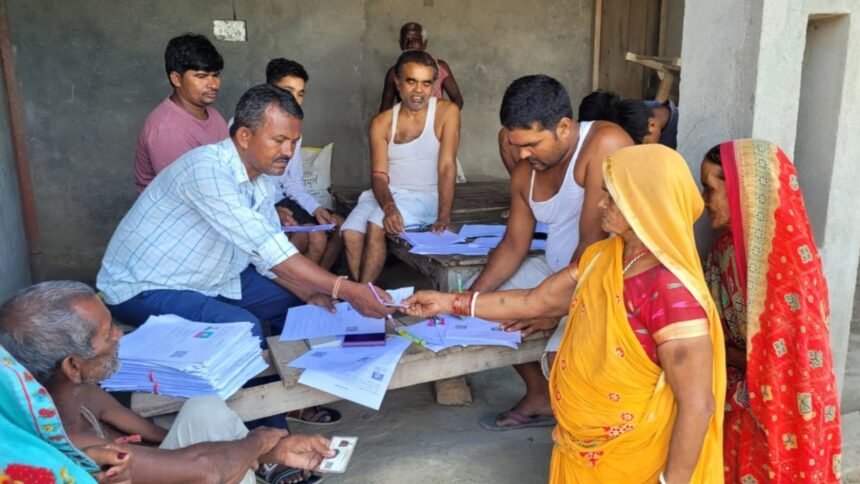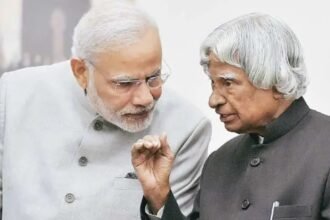The Association for Democratic Reforms (ADR), in its reply to the Election Commission’s counter in the Supreme Court, has argued that the poll body’s claim of having the constitutional authority to verify voters’ citizenship during the ongoing Special Intensive Revision (SIR) of Bihar’s electoral rolls flies in the face of past judgments. It also called the exclusion of Aadhaar and ration cards from the list of acceptable documents “patently absurd,” noting that Aadhaar is widely accepted when applying for passports, caste certificates, and permanent residence documents.
The petitioner further said the EC had failed to justify why the revision exercise must be rushed ahead of the upcoming Assembly elections, describing the manner in which it is being conducted as a “grave fraud” on the state’s voters.
Announced on June 24, the Special Intensive Revision (SIR) of Bihar’s electoral rolls has sparked controversy over both its timing and the requirement that voters enrolled after 2003 produce multiple documents to stay on the rolls, raising concerns about the potential disenfranchisement of a large number of electors and, eventually, prompting legal challenges in the SC.
Acting on the Court’s directions, ADR — a non-profit that works on electoral reforms — filed its rejoinder on Saturday to the Commission’s counter-affidavit submitted on July 21. In that filing, the Commission had argued that under Article 326 of the Constitution it is within its rights to verify the citizenship of electors, and clarified that removal from the electoral rolls does not amount to termination of an individual’s citizenship.
The matter is next listed for hearing on July 28.
Citizenship checks contradict SC rulings
Responding to the EC’s argument that it has the authority to verify voters’ citizenship, the petitioner said this contradicted previous Supreme Court rulings, including Lal Babu Hussain vs Union of India (1995), which held that the burden of proving citizenship lies with new applicants, not those already on the rolls. ADR also cited Inderjit Barua vs ECI (1985), where the Court held that being listed on the electoral roll was prima facie proof of citizenship, and the burden of disproving it rested with the objector.
The rejoinder pointed to the Commission’s instructions for the Bihar leg of the SIR, which require all voters added after 2003 to submit documents from a list of 11 prescribed by the EC, effectively putting the onus on post-2003 electors to prove their eligibility, including age and citizenship. “…It is submitted that the SIR process shifts the onus of citizenship proof on all existing electors in a state, whose names were registered by the ECI through a due process,” ADR submitted.
It argued that the Commission had not explained why the established process under the RP Act and the Registration of Electors Rules, 1960 had to be replaced with fresh documentation requirements and a new enumeration form. Nor, ADR added, had the Commission furnished any data on complaints about foreign nationals or illegal migrants being included on the rolls.
Story continues below this ad
Aadhaar exclusion is ‘absurd’
The poll body, in its July 21 affidavit, did not accept the apex court’s suggestion to consider Aadhaar, Voter ID, and ration cards as valid proof for the ongoing intensive revision in Bihar, arguing that Aadhaar and ration cards can be obtained through fraudulent or falsified documentation.
In its rejoinder, the NGO said that the 11 documents originally prescribed by the EC are equally susceptible to being procured using fake or false documentation.
“The fact that Aadhar card is one of the documents accepted for obtaining Permanent Residence Certificate, OBC/SC/ST Certificate and for passport – makes ECI’s rejection of Aadhar (which is most widely held document) under the instant SIR order patently absurd,” it added.
‘Grave fraud on voters of Bihar’
Calling the ongoing Special Intensive Revision (SIR) a “grave fraud on the voters of Bihar,” ADR said reports from the ground suggest that the Commission’s own June 24 guidelines are being violated Block Level Officers (BLOs).
Story continues below this ad
As per the order, BLOs were required to visit each home and give each elector two forms. “Many voters have reported that their forms have been submitted online, despite never having met with any BLOs or signed any documents. Forms of even dead individuals have been reported to have been submitted,” the rejoinder alleged.
ADR also flagged the lack of any clear procedure for scrutiny of the enumeration forms or verification of documents, arguing that this has handed Electoral Registration Officers (EROs) “arbitrary, unbridled and excessive discretionary powers, which can disenfranchise a huge percentage of population in Bihar.”
The June 24 EC order had stated that the last intensive revision in Bihar was conducted in 2003, and that the 2003 roll would serve as “probative evidence” of citizenship for existing electors. For electors born after July 1, 1987, the EC required proof of citizenship of at least one parent, though it allowed them to rely on the 2003 roll if their parents were on it. ADR, however, questioned this distinction, arguing that it puts electors registered after 2003 at “a larger risk of disenfranchisement.”
It also questioned why the ECI had not placed on record the order of the 2003 revision and asked the court to direct it to do so. In the case of a 2004 order for intensive revision in North East states, which is available publicly, only new electors were asked to supply documents. The 2004 exercise was conducted over six months (July 1, 2004 to January 3, 2005), while the Bihar roll is being revised within a three-month window from June 25 to September 30, it said.
Story continues below this ad
Why redo rolls when 2025 revision already done
The petitioner added that the EC had not explained why the SIR must be completed before the Bihar Assembly elections, or why the 2025 electoral roll, which underwent revision and was published in January, cannot be used for the upcoming polls.
ADR argued that updating the electoral roll is a continuous process that already accounts for migration, deaths, and other demographic changes. It cited a January 7 press release by the Bihar Chief Electoral Officer, which noted that the Special Summary Revision 2025 was conducted on the EC’s directions and had resulted in the addition of 12.03 lakh names and the deletion of 4.09 lakh.
ADR also referred to the EC’s instruction dated August 11, 2023, directing Chief Electoral Officers (CEOs) of all states and Union Territories to delete names from the rolls in cases of shifting, demographic similar entries (DSEs), and death.
No political party sought ‘de novo’ exercise
In its counter, EC had said that the SIR was being held to address the concerns of political parties. To this, ADR said “not a single political party had asked ECI for a de novo exercise such as the one prescribed in the instant SIR order. The concerns of political parties were on the issue of addition of non-existent votes and deletion of genuine votes supporting the opposition parties and on the issue of casting of votes after closure of polls.”
Story continues below this ad
The legal challenge to the Bihar SIR was first heard on July 10 by a two-judge vacation bench of Justices Sudhanshu Dhulia and Joymalya Bagchi. While the Supreme Court declined to restrain the Election Commission from going ahead with the exercise, it suggested that the poll panel also consider accepting Aadhaar, voter ID, and ration cards — in addition to the list of 11 prescribed documents — for updating the rolls. The Court allowed the Commission to file a counter-affidavit by July 21 and listed the matter for a further hearing on July 28.
By Friday, the Commission’s deadline for collecting enumeration forms had passed. The EC said it had received forms from 7.23 crore electors, who would be included in the draft electoral roll. Around 65 lakh names would be deleted, as those electors were found to have died, shifted permanently, been enrolled in two places, or were untraceable, the poll panel said.
Additional deletions may follow after the draft roll is published, as documents submitted by the 7.23 crore electors will be scrutinised before the final roll is released on September 30. Those excluded from the draft roll will have the opportunity to file claims and objections between August 1 and September 1.







